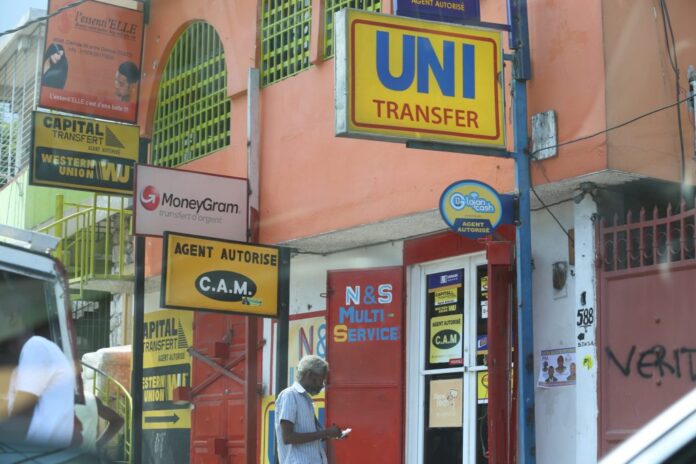The prices of goods in Haiti continue to fluctuate as the markets react to changes in the currency exchange rate. Some businesses follow the government’s mandate and others do not — leading to inconsistent prices across Haiti.
When G.T. went to pick up her monthly money transfer at MoneyGram on Sep. 30, the Port-au-Prince resident expected about 10,000 Haitian gourdes. But to her great surprise, the $80 in U.S. currency converted to approximately 5,000 gourdes.
Anxiety instantly filled G.T., 21, who has been receiving the remittance from her Among The Reeds sponsor for three years. An exasperated G.T. did not bother asking what caused the big drop. She already knew: the gourde’s value had skyrocketed.
The gourde’s value against the dollar went from 120 G in mid-August to 62 G in October.
“When you have 5,000 gourdes in your hand [for a month], you can’t really buy anything with it,” G.T., who preferred not to disclose her full name, said. “And prices didn’t really drop, it’s basically the same. I try to adapt, I made a plan. I can only buy things I need and can’t think about next month.”
The Haitian gourde’s value against the U.S. dollar went from 120 G in mid-August to 62 G in October. With the gourde’s rapid appreciation, thousands of Haitians, like G.T., who rely on money transfers from the United States, were left doing quick currency conversions to keep up with the values as they rose. The answer was always the same: their transfer was almost worthless.
Businesses have also been greatly affected, particularly the textile assembly industry. Many businesses in that sector said they plan to shut down by December because they can’t afford to pay employees the resulting higher wages.
Various economists were stumped by the gourde’s rise. After mulling it over, some presumed that the rapid rise is the result of monetary policy being implemented to repair Haiti’s economy after years of freewheeling money exchange transactions in the informal market and the banking system.

Eddy Labossière is a long-time consultant at Haiti’s central bank, the Banque de la République d’Haïti ( BRH). He doesn’t have all the answers but did confirm that the rapid rise partially happened because a monetary policy correction was needed. The government also said so in a note they wrote to foreign diplomats, saying that they needed to pour $150 million into the economy between Aug. 10 and Sep. 30 to buy back gourdes, according to the Miami Herald.
Some banks weren’t following the exchange rate policies set by the BRH, said Labossière. Banks were applying their own rates to currency exchanges to make higher profits off their clients, a widespread practice known as currency speculation.
Between January 2019 and August 2020, the gourde’s value dropped from 77 G per $1 to more than 120 G. The more gourdes people needed to receive U.S. dollars in return, the more gourdes went into the exchangers’ coffers. And the more the gourde’s value decreased.
“Once there is money speculation, there needs to be a correction,” Labossière said. “The banks were making profits from the gourde. They were making five gourdes in every single dollar in the transactions they were doing. That wasn’t normal.”
Money manipulation versus monetary policy
The BRH’s latest move in repairing the economy is that they injected $12 million into the foreign market to maintain the exchange rate of the gourde on Oct. 28.
In August, the BRH took action by issuing sanctions against UniBank Haiti and Capital Bank for not complying with money exchange regulations. It fined UniBank 864 million gourdes, about $13.7 million, and Capital Bank 3.9 million gourdes, or $62,144.
Capital Bank and UniBank have not returned emails seeking comment on their currency exchange transactions.
Labossière senses that currency manipulation is at play.
But after they were fined, the value of the gourde began to increase. This indicates that the banks started to comply with the BRH’s currency exchange regulation.
To determine the value of the gourde, factors such as the number of exports and imports, the amount of money being printed and circulated, and whether the country experiences a huge deficit or is stable, play a role, economists said.
Labossière, who also heads the Haitian Association of Economists (AHE), said none of those criteria were at play. In his 20-year experience, he has never seen such a rapid rise in Haiti.
The gourde’s value is now higher than what it was over a year ago before depreciating, which was about 70 G per U.S. dollar. Authorities are thrilled and plan to keep raising it until it reaches 25 G per U.S. dollar. Labossière senses that currency manipulation is at play.
“I feel like it’s the government and the central bank that are manipulating it [the gourde] now so it doesn’t depreciate,” Labossière said. “The president always says he’s happy in his speeches because before 70 gourdes was worth a dollar but now it’s less. That’s a victory for the president. If he considers it as a victory, he will keep it low.”
Winners and losers
One positive outcome of the gourde’s appreciation is that consumer goods prices went down — something that Haiti’s President Jovenel Moïse often says he’s fighting for.
“What I want is what you’re seeing,” Moïse said in a public address via Facebook on Oct. 9. “I want to break the high cost of living.”
A 50-pound bag of rice dropped from 2,500 G to 1,500 G, a bag of flour went from 3,000 G to 1,500 G, and a can of milk from 45 G to 25 G. The prices of spaghetti, macaroni, sugar, other food products, and beverages have also gone down.
“In an economy, there are always winners and losers,” Labossière said. “Everyone who receives money in American dollars dies in the movie.”
Residents who don’t rely on remittances are having less trouble purchasing food now. But the 1.1 million people, or 31 percent of adults, living in Haiti who do receive money from overseas regularly saw their funds cut in half.

G.T., who receives sponsorship because she lost her parents in the 2010 earthquake, is one of those recipients. She only buys essentials now.
Merchants and entrepreneurs, who barely had money saved, can purchase only half the amount of products they used to from overseas. Textile industry businesses, which did not exchange their U.S. dollars for gourdes before the appreciation, are in financial crisis now, Labossière said.
Fernando Capellan, president of the Industrial Development Company (CODEVI), has predicted that 25,000 textile employees will lose their jobs by December. Patrick Boisvert, Haiti’s minister of finance and economy, said he is in discussions with textile officials to address the issue.
Another group decrying the move are the money transfer/exchangers, whom the government told to pay out remittances in Haitian gourdes instead of in U.S. dollars, the longstanding practice. Many money exchange agents closed their businesses in protest, insisting that they need to conduct transactions in U.S. dollars to survive, according to a VOA Creole report.
Moïse understood that the gourde’s rise would have its pros and cons. “What’s important is that the majority of people are satisfied,” Moïse said. “For some people, the currency exchange isn’t in their favor but, don’t forget, that’s a minority [of the population].”
If Haiti’s currency value increases to 25 G per dollar as planned, food and beverage prices could drop to what they were a decade ago. A can of milk could cost just 15 G, Labossière said.
On the other hand, people who rely on money from abroad would see an additional reduction by half. G.T. is willing to cope with it.
“I’m not comfortable now because it’s not in my advantage,” she said. “But I will try to adapt to it obviously. When I do, I’ll be able to live with it.”
The original version of this article was published on the Haitian Times website.










